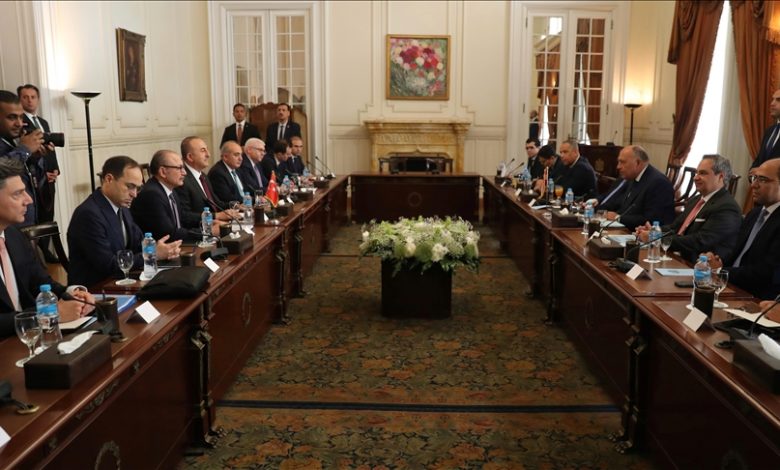Analysis: The tantalizing reconciliation between Türkiye and Egypt

The path of normalization is promising, but success will depend on the political will to convert the current overtures from transactional, tactical moves to long-term strategic commitments
After a decade of strained relations, Türkiye and Egypt finally show strong signs of a normalization period.
Following the solidarity and condolence visit of Egyptian Foreign Minister Sameh Shoukry to Türkiye after the devastating earthquake, Turkish Foreign Minister Mevlut Cavusoglu visited Cairo on March 18.
And, most recently, Shoukry visited Ankara for talks with his counterpart. Messages of economic cooperation and regional peace and stability were conveyed, and it was understood that the two countries could be represented at the ambassadorial level.
A meeting between Turkish President Recep Tayyip Erdogan and his Egyptian counterpart Abdel Fattah al-Sisi is expected at some stage. The handshake between the sides at the 2022 World Cup, facilitated by Qatar’s emir, broke the ice between the two leaders, and further conciliatory steps are expected. Geopolitical considerations regarding the Eastern Mediterranean and Libya, among other issues, and the reinforcement of economic ties have influenced the normalization’s trajectory.
A look at the recent history of bilateral relations
Strained relations marked the past decade. Despite the initial significance attributed to the Muslim Brotherhood issue for which Türkiye provided asylum, it appears to have taken on a secondary role in the current negotiation discussions after undergoing some changes in perception. The two governments supported opposing sides during the Arab Spring. The Turkish military involvement in Libya in 2020 was critical in saving the UN-recognized government in Tripoli. In contrast, Cairo put all its eggs in Haftar’s basket, whose ill-fated offensive dented the warlord’s chances to control the entire country. Nevertheless, the two nations’ leaders want to go past this legacy.
While this process has not been painless, it has paved the way to the path of reconciliation. This ongoing momentum has influenced other issues, such as the complex Eastern Mediterranean geopolitics. Ankara and Cairo seek common ground on maritime delimitation. Egypt’s recent announcement of a tender for energy exploration in the Eastern Mediterranean, which took into consideration the exclusive economic zone (EEZ) demarcated by Türkiye, is a productive step. [1]
In the past, Egypt was more aligned on Greek and Southern Cyprus positions. In August 2020, Greece and Egypt signed an exclusive economic zone agreement in response to Türkiye’s earlier maritime authorization pact with Libya in 2019.
Economic aspect of the relations
Moreover, it is important to highlight the economic aspect of the relationship. The Egyptian leaders seek to redress an ailing economy. Egypt’s tourism sector was devastated in the post-pandemic period, while the war in Ukraine pushed up global food and commodity prices. [2] Inflation has soared to over 40%, dragging the national currency to its lowest point ever.
The IMF has pledged $3 billion in funding [3] contingent upon implementing deep reforms. Cairo’s Gulf traditional bankrollers, such as Saudi Arabia, have also changed direction, only providing a lifeline if conditions are met. Saudi Finance Minister Mohammed Al-Jadaan said: “We used to give direct grants and deposits without strings attached. And we are changing that.” A similar disappointment occurred with the UAE, underscoring Cairo’s limbo and desperate need for assistance.
Paradoxically, despite the Turkish-Egyptian political frictions last decade, the economic ties between the two sides remained solid. Bilateral trade has witnessed considerable growth, with trade value increasing [4] by 14% year-on-year, totaling $7.70 billion in 2022, up from $6.70 billion. Egyptian exports to Türkiye also experienced a surge, reaching $4 billion in January-December 2022, an increase of 32.30% from $3 billion.
Moreover, Egypt may benefit from energy cooperation [5] with Türkiye in the Mediterranean. This issue could further cement bilateral relations between Cairo and Ankara. President Erdogan once highlighted [6] the distinct nature of Türkiye’s ties with Egypt, emphasizing the search for regional peace in the hands of Türkiye and Egypt.
Can the differences be narrowed down?
Regarding the Libya conundrum, while progress is still distant, the fact that Haftar has recently sided [7] with Egypt’s enemies in Sudan creates some opportunities for both sides to narrow down their differences. Cairo has long nurtured ambitions to have a key role in post-war reconstruction in Libya. After betting on Haftar, Egypt made a U-turn, forging multiple economic deals [8] with the Tripoli-based Government of National Accord (GNA). However, Libyan reconciliation is a complex matter. Türkiye and Egypt differ on how best to move forward. While Ankara insists on preserving constitutional order in Libya by holding free and fair elections, Cairo sees things differently. If both sides manage to work together, exciting opportunities [9] could open up, contributing to a brighter future for Libya.
In any case, Cairo seems to have recognized that Turkish interests and concerns cannot be dismissed. This situation has prompted Egypt to re-evaluate its approach, revisiting its past entente with Greece. The path of normalization is promising, but success will depend on the political will to convert the current overtures from transactional, tactical moves to long-term strategic commitments.
Source: AA / TRT World Research Center





